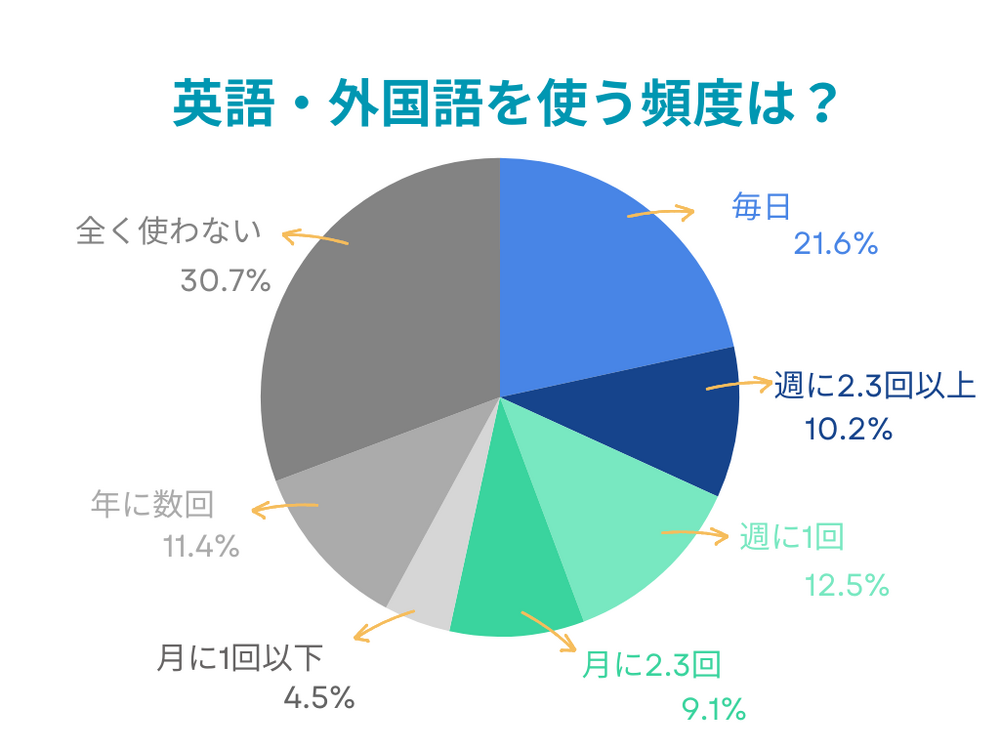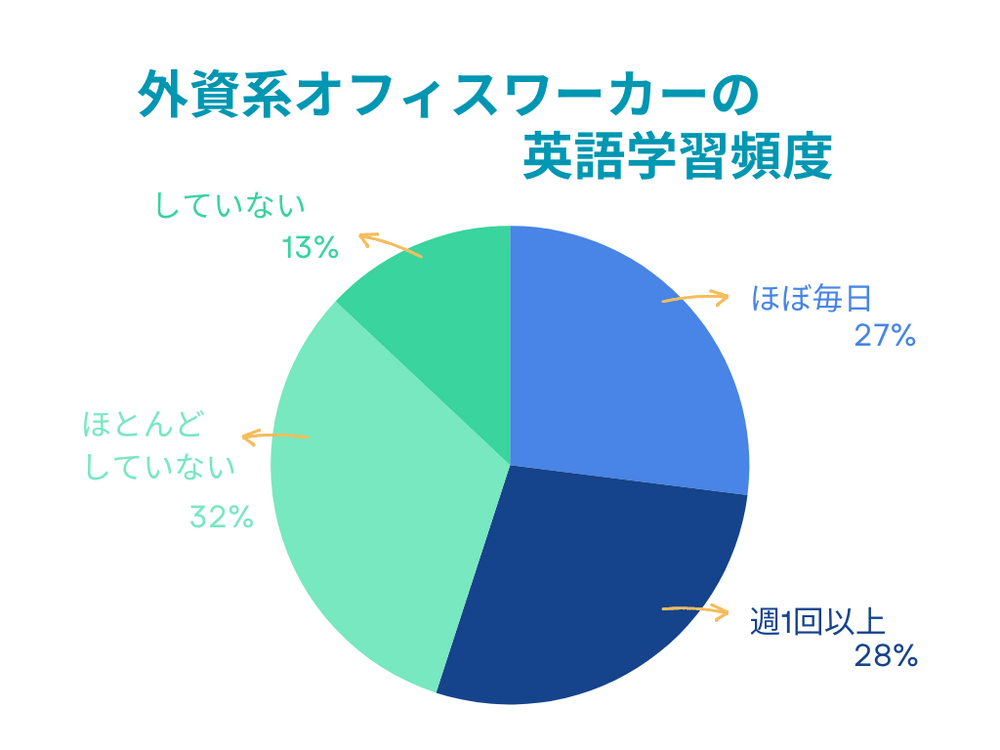「自分の英語力は、外資系企業で通用するのだろうか?」
英語力を活かして仕事をしたいけれど、実際職場でどの程度の働きができるのかがわからなくて不安になりますよね。しかしそのせいで憧れの外資系企業を諦めるのはもったいない!業界や職種によって必要な英語力は様々です。
そこで今回は、外資系企業で必要な英語力について徹底解説します。実務での使用ポイントもご説明しますので、入社後のイメージを固めてぜひ憧れの外資系企業での仕事をGetしてくださいね!

「自分の英語力は、外資系企業で通用するのだろうか?」
英語力を活かして仕事をしたいけれど、実際職場でどの程度の働きができるのかがわからなくて不安になりますよね。しかしそのせいで憧れの外資系企業を諦めるのはもったいない!業界や職種によって必要な英語力は様々です。
そこで今回は、外資系企業で必要な英語力について徹底解説します。実務での使用ポイントもご説明しますので、入社後のイメージを固めてぜひ憧れの外資系企業での仕事をGetしてくださいね!
Do you wonder if your English skills will be accepted at a foreign company?
You want to put your English skills to good use, but you are not sure how well you will be able to perform in the workplace. However, it would be a waste to give up on your dream job at a foreign company because of this! The English proficiency required varies depending on the industry and type of job.
In this article, we will provide a thorough explanation of the English language skills required at a foreign company. We will also explain the key points to use in practice, so that you can solidify your image after joining a company and get the job at a foreign-capital company of your dreams!

実は外資系企業で必要とされる英語力は、ネイティブ並みに流暢に英語を使いこなす必要がある業務から、英語にアレルギーがなければ問題ないという業務までと様々です。実際に外資系企業に就業している人の英語活用頻度は下記のグラフの通りです。

参考:マイナビ転職|転職ノウハウ「外資系企業で働いている人に聞いた!英語・外国語を使う頻度は?」
英語を活かそうと思っても、4割近くが英語をめったに使わない職場のようです。では外資系企業ではどのような職場がどのくらいの英語力が必要か、細かく見ていきましょう。
外資系企業でも、英語を使用しない職場があります。社員のほとんどが日本人で、顧客も日本人を相手にしている場合です。例えば日本国内の営業職やアパレルの販売員です。周りが日本人のため、コミュニケーションは当然日本語で行われ、英語力はほとんど必要としません。
そのような職場の事務職も、レポートの提出先が日本人ならば日本語のケースがほとんどです。
ただし本社からの通達や提出書類が英語の場合があるので、英語アレルギーだときついと感じるでしょう。また最初は英語の必要性がなくても、ポジションが上がり、本国にレポートの提出があったり、ミーティングの出席を求められたりすると英語が必要になってきます。
業界によって必要とされる英語力は変わってきます。
金融業界はちょっとした聞き間違いや、ニュアンスの違いだけでも致命的なミスとなるケースがあるため、非常に高い英語力を求められます。対面でのやり取りはもちろん、電話応対、資料やレポートを読み込む力、資料作成などのライティング力が必要です。金融業界はネイティブ並みの英語を求められるため、帰国子女や留学経験者が多いのも特徴です。
IT業界の外資系企業は、企業規模と日本進出をしてからの期間によって必要な英語力が異なります。小規模な企業は海外とのコミュニケーションを要求されるケースがあります。日本で歴史が浅い企業はマニュアルが日本語で整っていない場合があるため、読解力と英語での専門知識が必要です。一方大手IT企業はすでに日本語マニュアルが存在しているなど、日本語ノウハウがあるため、それほど高い英語力が求められない場合があります。
製薬・医療業界では、医療機器の使用効果や副作用報告などの資料が英語のため、専門用語を読みこなす読解力が必要です。
メーカー(自動車・電気・電子)は、営業職とエンジニアで必要とされる英語力は変わってきます。営業職は国内顧客がメインとなるため、入社時には高い英語力は必要ありません。エンジニアは実務経験が不可欠で、専門用語を含めた英語を理解し、読み書き会話をそつなくこなす力が必要です。
外資系企業は職種によっても要求される英語力が異なります。
マーケティングは売り上げなどの数値を扱うだけでなく、広告なども扱うため感性に関する会話もしなければなりません。本社と掛け合って交渉する場面も出てくるので、高い英語力が必要です。
人事は「社員がメンタル面でダウンした」「たれ込みで素行の悪い社員がいるとあったが、どう調査するか」など、複雑な状況を英語で説明する場面が出てきます。そのためかなりの英語力が必要です。また多くの会社が、日本独自の労務や組合問題を英語で説明できる程度の英語力を求めています。
経理・財務は最低限業務上、英文メールの「読み書き」と日常的な確認程度の会話力が求められます。ただし、外資系企業は英文経理が必要になるため、USCPA(米国公認会計士)の資格が欲しいところです。その場合試験がすべて英語になるため、英語検定2級〜1級レベルの英語力があると良いでしょう。

In fact, the English proficiency required by foreign-affiliated companies varies from tasks that require fluent use of English like a native speaker to tasks that are not a problem if you are not allergic to English. The following graph shows the frequency of English usage by people actually working for foreign companies.

Reference: Mynavi Job Change|Career Change Know-How "How often do you use English and foreign languages? How often do you use English or other foreign languages?
It seems that nearly 40% of those who want to make use of their English rarely use it in their workplaces. Let's take a closer look at what kind of workplaces in foreign-affiliated companies require English proficiency and at what level.
Even in foreign-affiliated companies, there are workplaces where English is not used. This is the case when most of the employees are Japanese and the customers are also Japanese. For example, sales staff in Japan or apparel sales staff. Since they are surrounded by Japanese, communication is naturally conducted in Japanese, and English skills are rarely required.
In most cases, clerical workers in such workplaces also use Japanese if the person to whom they submit reports is Japanese.
However, there are cases where notices from the head office and documents to be submitted are in English, so if you are allergic to English, you may find it tough. Even if English is not required at first, it will become necessary as you advance in your position and are required to submit reports to the home country or attend meetings.
The English language skills required will vary depending on the industry.
The financial industry requires a very high level of English proficiency, as even a slight mishearing or difference in nuance can be a fatal mistake in some cases. In addition to face-to-face communication, you need to be able to answer phones, read documents and reports, and write documents. Because the financial industry requires native-like English, many of its employees are returnees or have studied abroad.
Foreign companies in the IT industry require different levels of English proficiency depending on the size of the company and the length of time they have been in Japan. Smaller companies may require communication with foreign countries in some cases. Companies with a short history in Japan may not have manuals ready in Japanese, so reading comprehension and expertise in English are required. On the other hand, large IT companies already have Japanese-language manuals and other Japanese know-how, so a high level of English proficiency may not be required.
In the pharmaceutical and medical industries, documents such as reports on the effectiveness of medical devices and side-effect reports are written in English, so reading and understanding technical terms is a must.
In the manufacturing (automotive, electrical, electronics) industry, English proficiency is required for sales and engineering positions. Salespeople do not need a high level of English proficiency when they join the company, as their main customers are domestic customers. Engineers need practical experience and the ability to understand English, including technical terms, and to read, write, and speak English fluently.
English proficiency requirements for foreign-affiliated companies vary depending on the type of job.
Marketing not only deals with sales and other numerical figures, but also with advertising and other matters, so it is necessary to speak with sensitivity. There will also be situations where you will need to negotiate with the head office, so a high level of English proficiency is necessary.
In human resources, there will be situations where you will have to explain complex situations in English, such as, "An employee has a mental breakdown," or "I heard through a tip-off that there is an employee with bad behavior, but how should we investigate? Therefore, considerable English proficiency is required. Many companies also require that you have sufficient English language skills to explain labor and union issues unique to Japan in English.
Accounting and finance positions require, at a minimum, the ability to read and write emails in English and to speak English on a daily basis. However, foreign-affiliated companies require English-language accounting, so a USCPA (U.S. Certified Public Accountant) certification is desired. In this case, the examinations are all in English, so it is recommended that you have English proficiency at the level of Level 2 to Level 1 of the English Proficiency Test.

各業界、職種で必要な英語力についてご紹介しましたが、実際英語力を活かす業務にはどのようなものがあるのでしょうか?英語を使う実務とそのポイントについて説明します。慣れておくために事前練習したり、イメージを固めたり、足りないスキルを補うよう勉強しておくのと良いでしょう。
外資系企業に入って多くの人が苦手とするのは、電話応対です。電話では相手の表情、身振り手振りが見えないため、正確に聞き取るリスニング力が必要になります。聞き取れなかった場合は再確認をするために、表現を変えて質問するなどのスキルが必要になります。
英語を使用する業務で一番多いのがメールのやり取りです。返信が遅かったり、読解や英作文スキルが低かったりすると意思疎通に時間を要して、仕事が思うように進みません。
メールのポイントは「簡潔に」です。修飾節が長く続く長文は望ましくありません。
箇条書きでわかりやすくしたり、要点のみ書き、詳細は添付ファイルを読んでもらったりすると良いでしょう。メールを送った後に電話でフォローする手段もあります。
資料作成にあたって事前に英語の資料を読み込んだり、自分の考えを的確に英語で説明したりするスキルが必要になります。資料にはある程度定型化された表現やフォーマットがあるため、既存ドキュメントを事前に読み込んで勉強しておくのがポイントです。
電話と異なり対面で行われるミーティングは、参加者の身振りや表情が確認できるため、意思の疎通がしやすくなります。一方参加態度により、自信の有無や積極性が表れてしまうので注意が必要です。
ミーティングに参加する際のポイントは以下の通りです。
参加する企業や国が違うため、それぞれ異なる文化背景を持っています。リスニングとスピーキングスキルに加え、コミュニケーションスキルも必要です。
プレゼンテーションは自分の価値や能力を示せるため、非常に重要な機会です。プレゼンテーションをするうえでのポイントは、ゆっくり、はっきりとした発音を心掛けることです。
またPREPという「型」でプレゼンテーションを進めていくと、外国人に受け入れられやすいといわれています。
PREPとは以下の方法です。
実際の使い方としては、
このような順番で進めていくと、聞き手にとってわかりやすくなります。

Now that we have introduced the English language skills required for various industries and positions, what are the tasks that actually make use of English language skills? The following is an explanation of the key points of English work. It is a good idea to practice in advance to familiarize yourself with the job, to get a clear image of what you will be doing, and to study to make up for any skills you may lack.
One thing many people who join a foreign company have difficulty with is answering the phone. Since you cannot see the other party's facial expressions and body language over the phone, you need to be able to listen accurately. If you do not understand something, you need to be able to ask questions with different expressions in order to reconfirm your understanding.
The most common type of work in which English is used is e-mail communication. If replies are slow or if reading and writing skills are poor, communication will take time and work will not progress as smoothly as expected.
The key to e-mail is to be concise. Long sentences with long modifying clauses are undesirable.
Use bullet points for clarity, or write only the main points and ask the reader to read the attachment for details. You can also follow up with a phone call after sending the email.
In order to prepare documents, it is necessary to read English documents in advance and to have the skills to explain your ideas accurately in English. Since there are certain standardized expressions and formats for documents, it is important to read and study existing documents in advance.
Unlike telephone meetings, face-to-face meetings are easier to communicate because participants' body language and facial expressions can be observed. On the other hand, the attitude of the participants may reveal their confidence or lack thereof, as well as their aggressiveness.
The following are points to keep in mind when participating in a meeting.
Each participating company and country has a different cultural background. In addition to listening and speaking skills, communication skills are also necessary.
Presentations are very important opportunities because they allow you to show your value and abilities. The key to giving a presentation is to pronounce slowly and clearly.
It is also said that if you use the PREP presentation format, you will be more likely to be accepted by foreigners.
PREP is the following method.
In actual usage,
Proceeding in this order makes it easier for the listener to understand.

「あの人は流暢に英語が話せるけれど、学生英語なんだよな」
外資系企業に入ると、たまにこのような会話が聞こえてきます。帰国子女でネイティブ並みにペラペラと英語が話せるけれども、ビジネス英語ができていないのです。外資系企業で活躍をしたいのならば、正確なビジネス英語を身につける必要があります。
そのほかにも外資系企業入社後でも英語力をアップさせるべき理由があります。
英語をあまり使用していない部署でも、キャリアアップのためには高度な英語が必要になります。TOEICが全てではありませんが、役職によって目安となるスコアは以下の通りです。
<役割で必要とされる英語力>
マネージャー以上の役職になると、本社へ英語でレポートを提出したり、グローバルミーティングなどに英語で出席したりする機会があります。ミーティングでは「ただ参加しているだけ」にならないように自分の意見を発言しなければなりません。また英語が出来れば海外出張や、グローバルプロジェクトのメンバーに選ばれる可能性もあります。英語力があると、スキルアップやキャリアアップのチャンスを掴めるのです。
外資系企業でキャリアアップを考えるならば、高度な英語力は必須です。
外資系企業で働いていても自分の英語力に満足できない人は意外に多く、半数近くの人は働きながら英語学習を続けています。

対象:英語を使って仕事をしている「バイリンガル・スペシャリスト」152人
参考:ロバート・ウォルターズ・ジャパン株式会社「バイリンガル・スペシャリストアンケート調査」
主な勉強方法は以下の通りです。
英語になるべく触れようと、休日にじっくりと英語で洋画や海外ドラマを見たり、通勤の隙間時間に英語のテレビやラジオを聞いたりと、時間をうまく活用する方法を多くの人が取り入れています。
また職場にいる外国人の同僚と積極的に英語で会話をしています。生の英語に触れる方法は、外資系ならではの学習方法ですよね。
王道の英会話スクールやオンラインレッスン受講者は、ディスカッションやビジネス英語を学び、友人との会話では手に入らないスキル取得に励んでいます。
外資系企業に入ったからといって英語学習は終了ではなく、英語力の向上、維持のために努力が必要なことを念頭に置いておきましょう。

That person speaks fluent English, but it's student English."
When you enter a foreign company, you sometimes hear conversations like this. They are returnees who can speak English as fluently as native English speakers, but they are not proficient in business English. If you want to be successful in a foreign company, you need to learn accurate business English.
There are other reasons why you should improve your English skills even after joining a foreign company.
Even in departments that do not use much English, you will need a high level of English to advance in your career.
<English language skills required for the role>
Managers and above have the opportunity to submit reports to the head office in English and attend global meetings in English. At these meetings, you are required to express your opinions so that you do not "just participate". If you can speak English, you may be selected for overseas business trips or as a member of global projects. Having English language skills will give you the opportunity to improve your skills and career advancement.
A surprisingly large number of people are not satisfied with their English skills even when working for a foreign company, and nearly half of them continue to learn English while working.

Target: 152 "bilingual specialists" who work in English
Reference: Robert Walters Japan K.K. "Bilingual Specialist Survey
The main study methods are as follows
Many people are making good use of their time by watching foreign films and foreign dramas in English on their days off and listening to English-language TV and radio during their commute to work, in order to get as much exposure to English as possible.
They also actively engage in English conversation with their foreign colleagues at work. Exposure to live English is a method of learning that is unique to foreign-affiliated companies.
High street English conversation schools and online lesson participants are learning discussion and business English, and working hard to acquire skills that are not available through conversations with friends.
Keep in mind that your English learning does not end when you join a foreign company, but rather you need to work hard to improve and maintain your English skills.

「英語を活かして仕事をしたい!」そう思う一方で、初めての外資系企業転職に少し尻込みをするならば、転職準備を万全にして臨みましょう。以下の対策をしっかりとれば、自分の英語力に合う仕事が見つかりますよ。
「簡単なメールのやり取りだけだと思っていたのに電話応対もあった」自分の実力以上の英語力を求められる職場はつらいものです。このように企業とのミスマッチを起こさないためにも、英語活用頻度は事前調査しておきましょう。
企業のホームページや口コミなどから分かるケースもありますが、一番確かなのは転職エージェントに確認してもらうことです。直接企業に業務での英語使用頻度を聞いてもらうので、直近の使用状況が確実に手に入ります。
外資系企業に応募する際には、英文レジュメの提出を求められます。英文レジュメは日本でいうところの「履歴書」と「職務経歴書」が一体となったようなものです。日本の履歴書のように決まった型がないため、書き方によっては読み手にまったく違った印象を与えます。
書き方の形式はおもに以下の3つが定番です。
外資系企業は日本の企業とは異なり、実力主義のため「仕事につながる能力」や「過去の実績」に注目します。生年月日や性別、趣味・特技など日本の履歴書に書くような個人的な情報を書く必要がありません。仕事に直結する内容を記載します。
英文レジュメ作成のポイント
外資系企業に提出する英文レジュメにTOEICスコアを書くべきかどうかは、スコアと働く職場の英語活用頻度によります。ビジネスで通用する英語はTOEIC700点からといわれているので、英語を普通に活用する職場なら700点以上、あまり英語活用頻度がない職場なら、600点くらいのスコアから書きます。
普段使っている英語とは異なるので、初めての英文レジュメ作成時は戸惑うことも多いでしょう。日本語の履歴書同様、誤字脱字は採用担当者にマイナスなイメージを与えます。ネイティブ或いは外資系転職エージェントなど、プロの目で一度確認してもらうことをおすすめします。
外資系企業転職の対策として、英語面接は外せません。面接官が外国人ならば、面接は最初から英語で進行されるケースがほとんどです。面接官が日本人の場合は、応募しているポジションによります。英語使用頻度が高いポジションは英語面接、あまり英語を使わないポジションは日本語面接です。最初は日本語で始まった面接が途中で英語に切り替わるケースもよくあります。英語アレルギーがない程度のポジションでも、確認程度に”How do you spend your free time?”(趣味は何ですか?)など、スモールトークをするケースがあるので心構えはしたほうが良いでしょう。
英語面接で聞かれることはだいたい決まっています。事前に練習しておくことで、本番頭が真っ白になって答えられなくなる事態は避けられます。練習は1人ではなかなか出来ません。英会話スクールや外資系転職エージェントが面接対策を行なっている場合があるので、活用すると落ち着いて本番に臨めますよ。
英語面接については「外資系面接で多い20の英語質問を和訳付きで紹介!流れやコツも解説します」をご一読ください。

I want to work in English! If you think so, but are still a little daunted by the prospect of changing jobs for the first time, you need to prepare yourself thoroughly for your new job. If you take the following steps, you can find a job that suits your English skills.
It is difficult to work at a place that requires more English than you are capable of. To avoid such mismatches with companies, it is advisable to research in advance how often English is used in your job.
In some cases, you can find out through company websites or word of mouth, but the best way to be sure is to ask a recruitment agent to check. They will ask the company directly how often they use English in their work, so you can be sure to get the most recent usage status.
When applying to a foreign company, you will be asked to submit a resume in English. An English resume is like a combination of a Japanese "résumé" and a "curriculum vitae". There is no set format like a Japanese resume, so depending on how you write it, it can give a completely different impression to the reader.
The following are the three main formats.
Unlike Japanese companies, foreign-affiliated companies are meritocratic and focus on "abilities that lead to a job" and "past achievements. There is no need to write personal information such as date of birth, gender, hobbies, special skills, etc. that you would write on a Japanese resume. Include content that is directly related to the job.
Key Points for Writing a Resume in English
Whether or not you should include your TOEIC score on your English resume for a foreign company depends on your score and how often you use English in the workplace. It is said that a TOEIC score of 700 is the minimum for business English, so if your workplace uses English regularly, you should write a TOEIC score of 700 or higher.
If you are not used to using English very often, you should start with a score of around 600. As with a Japanese resume, typos and omissions can give a negative impression to the hiring manager. We recommend that you have your resume checked by a professional, such as a native English speaker or a foreign-capital recruitment agent.
English interviews are an essential part of the preparation for changing jobs at a foreign company. If the interviewer is a foreigner, the interview will be conducted in English from the beginning in most cases. If the interviewer is Japanese, it depends on the position you are applying for. If the position requires frequent use of English, the interview will be conducted in English, and if the position does not require much use of English, the interview will be conducted in Japanese. There are often cases where an interview that started in Japanese switches to English in the middle of the interview. Even for positions where you are not allergic to English, you may be asked "How do you spend your free time? (What are your hobbies?).
There are usually certain questions that will be asked during an interview in English. By practicing in advance, you can avoid the situation in which you find yourself unable to answer the interview questions because your mind goes blank. It is not easy to practice by yourself. Some English conversation schools and recruitment agencies offer interview preparation services.
For more information on interviewing in English, please refer to the article “20 Common Interview Questions in English with Japanese Translation! ”

外資系企業で英語を活かして仕事をしたい!と思っても、必要とされる英語力は業界や職種によって様々です。入社してからの「こんなはずではなかった」を避けるためにも、どの程度の英語力が必要なのかは事前に調べておきましょう。
外資系転職には外資系転職エージェントの利用をおすすめします。英語使用頻度の確認や英文レジュメ、英語面接などに有効なノウハウを持っているので、あなたをしっかりとサポートしてくれます。
1人で悩んでいる時間はもったいない!外資系転職エージェントを活用して、あなたに合った職場を時間かけずに獲得しましょう!

I want to work for a foreign company in English! Even if you think you want to work at a foreign company, the English proficiency required varies depending on the industry and the type of work. To avoid any "this wasn't supposed to happen" after you join a company, it is important to find out in advance what level of English proficiency is required.
We recommend using a foreign-capital recruitment agent to help you change jobs. They have effective know-how in checking the frequency of English usage, English resumes, English interviews, etc., and will support you well.
Don't waste time worrying alone! Use a recruitment agent to find the right job for you in no time!
